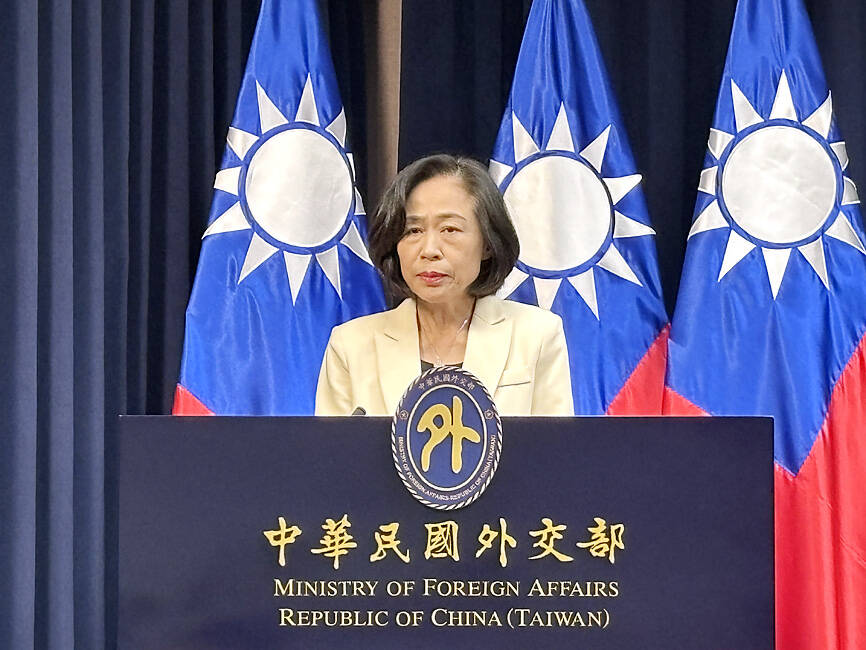The Ministry of Foreign Affairs (MOFA) would continue working through multiple channels to solicit support from member countries this year to join the Comprehensive and Progressive Agreement for Trans-Pacific Partnership (CPTPP), a ministry official said yesterday.
Taiwan applied to join the trade bloc on Sept. 22, 2021, shortly after China’s application on Sept. 16. Both applications have been stalled.
Department of International Cooperation and Economic Affairs Director-General Vivian Lien (連玉蘋) said that joining the CPTPP remains a key policy objective of the government.

Photo: CNA
CPTPP ministers in Peru in May last year established an informal standing forum to facilitate information sharing to foster a fair and efficient process — in line with the “Auckland Principles” — for accessions to the group, Lien said.
The principles are a set of criteria to evaluate potential new members, which include readiness to meet the agreement’s high standards, a good track record of upholding trade obligations and consensus among existing members, she said.
A joint statement issued after a CPTPP Commission meeting in November last year reaffirmed the importance of the principles, while announcing the establishment of an Accession Working Group for Costa Rica, she said.
Lien said that the announcement was a positive sign, as Costa Rica applied for membership in 2022, indicating that the CPTPP was reviewing applicants based on the principles, rather than the order in which their applications were filed.
The Ministry of Foreign Affairs this year would continue its efforts to win support from CPTPP members, mainly through arranging face-to-face meetings between Taiwan and member countries’ officials, and bolstering industrial cooperation with member countries, such as in the fields of semiconductors, supply chains and hydrogen energy, she said.
It would also initiate a media campaign under the theme “Growth and Prosperity over Geopolitics: The CPTPP is Stronger with Taiwan,” to highlight that Taiwan’s ascension to the group is not a political issue and that Taiwan can have industrial, economic and trade cooperation with member countries, she said.
MOFA also aims to develop more local support through the World Taiwanese Chambers of Commerce and by enhancing connections with local business associations in member countries, she added.
In addition, Taiwan’s representative office in Australia has also commissioned the Australian series The Airport Economist to make a special episode about Taiwan, in which the show would speak with Deputy Minister of Foreign Affairs Francois Wu (吳志中) and Taiwan’s industrial leaders about the nation’s economic and trade advantages, Lien said.
The Taiwan External Trade Development Council (TAITRA) has also led Taiwanese solar energy and energy storage industry representatives to attend a Solar & Storage Live exhibition in Australia last month, she said.
The ministry also commissioned TAITRA to lead industrial cooperation teams to like-minded member countries, including Australia, Japan and the UK, in June, she said.
Regarding a comment by a US academic that China is showing renewed interest in joining the CPTPP amid a trade dispute with the US, Lien said that China must still meet the Auckland Principles, but its massive use of government subsidies and lack of transparency in state-owned enterprises’ operation shows it does not meet the CPTPP’s high standards.
Many academics have said that one of the reasons that China wants to join the CPTPP is to block Taiwan’s participation, she said.
However, the member countries would strictly review whether China meets the criteria of the Auckland Principles, she added.

A small number of Taiwanese this year lost their citizenship rights after traveling in China and obtaining a one-time Chinese passport to cross the border into Russia, a source said today. The people signed up through Chinese travel agencies for tours of neighboring Russia with companies claiming they could obtain Russian visas and fast-track border clearance, the source said on condition of anonymity. The travelers were actually issued one-time-use Chinese passports, they said. Taiwanese are prohibited from holding a Chinese passport or household registration. If found to have a Chinese ID, they may lose their resident status under Article 9-1

Taiwanese were praised for their composure after a video filmed by Taiwanese tourists capturing the moment a magnitude 7.5 earthquake struck Japan’s Aomori Prefecture went viral on social media. The video shows a hotel room shaking violently amid Monday’s quake, with objects falling to the ground. Two Taiwanese began filming with their mobile phones, while two others held the sides of a TV to prevent it from falling. When the shaking stopped, the pair calmly took down the TV and laid it flat on a tatami mat, the video shows. The video also captured the group talking about the safety of their companions bathing

A classified Pentagon-produced, multiyear assessment — the Overmatch brief — highlighted unreported Chinese capabilities to destroy US military assets and identified US supply chain choke points, painting a disturbing picture of waning US military might, a New York Times editorial published on Monday said. US Secretary of Defense Pete Hegseth’s comments in November last year that “we lose every time” in Pentagon-conducted war games pitting the US against China further highlighted the uncertainty about the US’ capability to intervene in the event of a Chinese invasion of Taiwan. “It shows the Pentagon’s overreliance on expensive, vulnerable weapons as adversaries field cheap, technologically

Starting on Jan. 1, YouBike riders must have insurance to use the service, and a six-month trial of NT$5 coupons under certain conditions would be implemented to balance bike shortages, a joint statement from transportation departments across Taipei, New Taipei City and Taoyuan announced yesterday. The rental bike system operator said that coupons would be offered to riders to rent bikes from full stations, for riders who take out an electric-assisted bike from a full station, and for riders who return a bike to an empty station. All riders with YouBike accounts are automatically eligible for the program, and each membership account